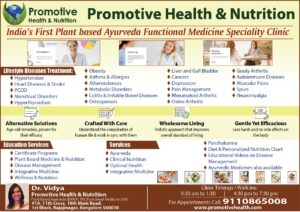Plant based diet and lifestyle helps to clean the system, helps reverse diseases and reach optimal health. There’s excellent scientific evidence that many chronic diseases can be prevented, controlled, or even reversed with a whole-food, plant-based diet.


We as humans have survived millions of years throughout human history majorly on plants. Although an omnivore diet is acceptable in the present age with emphasis on proteins being the most important building block of life, A plant-based diet on the contrary provides necessary macro and micro nutrients that are not only clean but also which supports your immune system. Plants have essential nutrients that can be readily absorbed from other foods. A variety of vitamins and minerals, phytochemicals and antioxidants in plants helps nourish your cells to achieve optimal health and brings the body in balance so that your immune system can function at its best. A vegetarian 🌱/ Vegan diet finds its origins in Vedic history. A quick peep into the history explains the wisdom behind this practice.
Hinduism supports a vegetarian way of life:
Hinduism has the most profound connection with a vegetarian way of life and the strongest claim to fostering and supporting it. In the ancient Vedic period (between 1500 and 500 BCE), although the laws allowed the consumption of some kinds of meat, vegetarianism was encouraged. Hinduism yields several foundations for vegetarianism as the Vedas, the oldest and sacred texts of Hinduism, assert that all creatures manifest the same life force and therefore merit equal care and compassion.
A number of Hindu texts place injunctions against meat eating and others like the Ramayana and Mahabharata advocate for a vegetarian diet. In Hinduism, killing a cow is traditionally considered a sin. Vegetarianism has been a constant practice and also deemed mandatory for Hindu yogis, both for the practitioners of Hatha Yoga and for the disciples of the Vaishnava schools of Bhakti Yoga (especially the Gaudiya Vaishnavas). A bhakta (devotee) offers all his food to Vishnu or Krishna as prasad before eating it. Only vegetarian food can be accepted as prasad.
According to Yogic thought, Sattvik food (pure or having good impact on body) is meant to calm and purify the mind “enabling it to function at its maximum potential” and keep the body healthy. Saatvik foods consist of “cereals, fresh fruit, vegetables, legumes, nuts, sprouted seeds, whole grains and milk taken from a cow, which is allowed to have a natural birth, life and death including natural food, after satiating the needs of milk of its calf”. But the present farming practices of dairy is nowhere close to this principle.
Shankar Narayan suggests that the origin of vegetarianism in India developed from the idea that balance needed to be restored. He claims, “Along with the development in civilisation, savagery also increased and those who were helpless and voiceless among both humans and non-human animals were more and more exploited and killed to satiate human needs and greed thus disturbing the balance of nature. But there were also many serious attempts to bring back sanity and restore balance from time to time.” He also says that the idea of living in harmony with nature became central to the rulers and kings.
Also watch:Massive Health Benefits of Plant-Based Diets
One of the most powerful steps you can take to improve your health, boost energy levels, and prevent chronic diseases is to move to a plant-based diet. If you’ve seen Forks Over Knives, you know that science shows changing your nutrition is a powerful way to live longer, help the environment, and reduce your risk of getting sick.


Many chronic diseases can be prevented
There’s excellent scientific evidence that many chronic diseases can be prevented, controlled, or even reversed with a whole-food, plant-based diet. Scientific research highlighted in the landmark book The China Study shows that a plant-based diet can reduce the risk of type-2 diabetes, heart disease, certain types of cancer, and other major illnesses. Many people also report bigger fitness payoffs, more energy, reduced inflammation, and better health outcomes after making the switch.
Ways to get started with a plant-based diet:
Here are some tips to help you get started on a plant-based diet.
1. Eat lots of vegetables. Fill half your plate with vegetables at lunch and dinner. Make sure you include plenty of colors in choosing your vegetables. Enjoy vegetables as a snack, juice, gravies, Sambar, chutneys, palya, poriyal and the list is endless!
2. Change the way you think about meat. Have smaller amounts. And slowly transition into zero animal foods.
3. Choose good fats. Fats in cold pressed oils, coconut nuts and nut butters, flaxseeds, and avocados are particularly healthy choices.
4. We Indians love our veggies with curry leaves and coriander as garnish. Greens on their own like Amaranth, Methi, Palak, Mustard greens, Mint(Pudina) are great with Rice and Chapatis. Our practice of eating millets adds to the fibre and carb intake.
5. Building a meal around a salad. Fill a bowl with salad greens such as carrots, cucumbers, tomatoes, knol kol, beetroot, onions, capsicum, greens, lettuce, and use a lovely imagination to add more crunchy and juicy veggies, fruits and nuts.
6. Eating fruit for dessert. A ripe, juicy peach, a refreshing slice of watermelon, or a crisp apple will satisfy your craving for a sweet bite after a meal.


Dr.Vidya | @DoctorVidya
Proprietor
Promotive Health and Nutrition
HealthSaveMovement India Campaigner
+91 9110965008
www.promotivehealth.com











